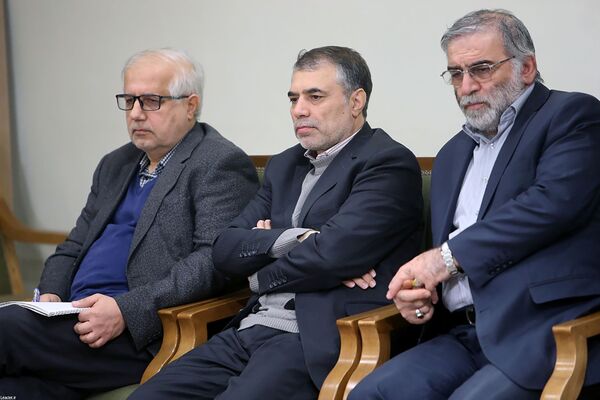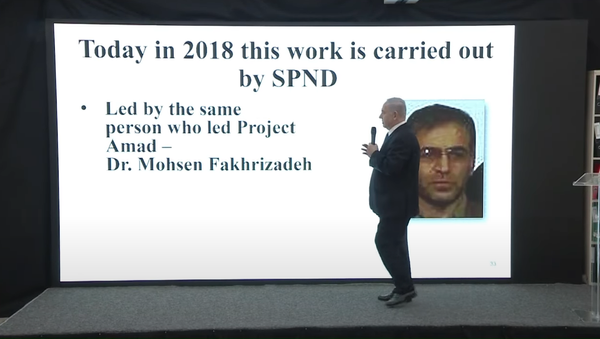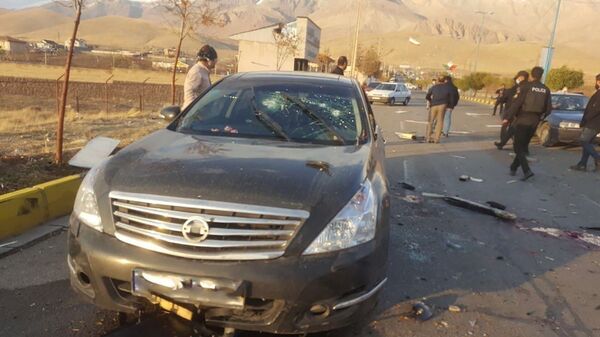A US official, along with two other intelligence officials, have claimed that Israel masterminded the assassination of Iranian scientist Mohsen Fakhrizadeh in a terrorist attack near the capital Tehran on Friday, according to The New York Times.
The report does not specify how much information the United States might have possessed in advance about the operation. There has not been any official comment on the report from the White House or the CIA.
Israel has neither confirmed nor denied being behind the death of Fakhrizadeh.
Previously, there have been multiple instances of Iranian nuclear scientists being targeted in direct assassination attempts, driving speculation that the Israeli intelligence agency Mossad might be behind them.
Deadly Ambush
Mohsen Fakhrizadeh, who headed the Iranian Defence Ministry’s Organisation of Defensive Innovation and Research (SPND), according to Fars news agency, was killed in the vicinity of Absard city of Damavand County, Tehran Province, at about 2.30 p.m. local time (11:00 GMT).

An explosive-laden car detonated near his vehicle, with small fire subsequently opened by a number of assailants, the Iranian defence minister confirmed. The wounded scientist was rushed to hospital by helicopter, but did not survive the injuries.
No one has yet claimed responsibility for the death of Fakhruzadeh.
‘Desperate Warmongering’
The assassination of the scientist was swiftly condemned by Iranian officials.
Iran’s President Hassan Rouhani accused Israel of the killing of the country’s prominent nuclear scientist, Mohsen Fakhrizadeh, according to state TV, adding that it shows the “depth of the enemy’s despair, and vowing that it will not slow down Iran’s nuclear path.
Iranian Foreign Minister Mohammad Javad Zarif also said that there were “serious indications” of Israel’s role in the elimination of Fakhrizadeh, and slammed ‘desperate warmongering of perpetrators’.
Terrorists murdered an eminent Iranian scientist today. This cowardice—with serious indications of Israeli role—shows desperate warmongering of perpetrators
— Javad Zarif (@JZarif) November 27, 2020
Iran calls on int'l community—and especially EU—to end their shameful double standards & condemn this act of state terror.
Iran's Ambassador to the UN Majid Takht Ravanchi also suggested that there were "serious indications of Israeli responsibility" in the assassination of the nuclear scientist, according to a letter to the United Nations published on Saturday.
.@TakhtRavanchi’s letter to #UN:Warning against any adventuristic measures by the U.S. & Israel,particularly during the remaining period of the current U.S.administration in office,Iran reserves its rights to take all necessary measures to defend its people & secure its interests pic.twitter.com/oOMNd1hL4t
— Alireza Miryousefi (@miryousefi) November 27, 2020
The envoy also warned against "any adventuristic measures" on the part of the United States and its ally in the region, Israel, stressing that Iran reserves its right to defend its citizens and secure its interests.
Iran's Supreme Leader Ayatollah Ali Khamenei has vowed to take revenge for the prominent scientist, similarly blaming Israel for his murder.
‘Highly Reckless’ Attack
While there has not been any public comment on the attack on the part of US President Donald Trump, Former Director of the Central Intelligence Agency John Brennan condemned the killing of the Iranian scientist, calling it “criminal” and “highly reckless.”
Brennan went on Twitter to also urge Iranian officials to “address the topic diplomatically”.
This was a criminal act & highly reckless. It risks lethal retaliation & a new round of regional conflict.
— John O. Brennan (@JohnBrennan) November 27, 2020
Iranian leaders would be wise to wait for the return of responsible American leadership on the global stage & to resist the urge to respond against perceived culprits. https://t.co/0uZhyBTM3S
The assassination comes as tensions have yet again spiked between Iran and the Trump administration, with media reports emerging alleging that the Israeli military had been instructed to gear up for a possible US military strike against Iran before the inauguration of a projected president-elect.
Trump, writes The New York Times, was dissuaded from striking Iran’s main nuclear site at Natanz two weeks ago, after his aides warned it could escalate into a broader conflict.
Tensions with Iran under the Trump administration came to a head after the US withdrew unilaterally from the Joint Comprehensive Plan of Action (JCPOA) in May 2018 and began to reimpose sanctions previously lifted under the nuclear deal.
Relations deteriorated further after US drone strikes in January killed Quds Force commander Maj. Gen. Qasem Soleimani, one of Iran’s topic officials. At the time US-Iran relations were pushed to the brink, with Iran vowing retaliation.
One of the US’s closest ally, Israel, has long been accusing Iran of secretly developing nuclear weapons, has been alleging that Mohsen Fakhrizadeh, who was a physics professor at the Imam Hussein University in Tehran as well as a member of the Iranian Revolutionary Guard, headed a secret unit within the Iranian military working on nuclear weapons.

Back in 2018, at a press conference, Israeli Prime Minister Benjamin Netanyahu mentioned Fakhrizadeh in a televised presentation of those he considered to be the most dangerous for his country when dwelling on the so-called "Iranian nuclear archive".
Israeli officials, together with US intelligence officials who reviewed the archive, claimed the scientist had kept elements of the programme alive even after it was ostensibly abandoned, running it covertly.
Consistent accusations have been lobbed both by Israel and the Donald Trump administration that Tehran is continuing to develop a nuclear arsenal. Dismissing the claims, Iran has maintained that its nuclear programme is designed to serve purely peaceful purposes.


